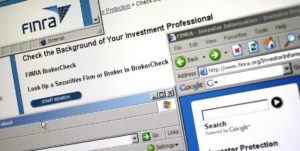Keep Track of Your Investments
Whether you work with a stockbroker or adviser or you trade on your own, you should always monitor your investments. By keeping an eye on your investments, you can prevent minor mistakes from turning into big problems. You can protect yourself by taking the following steps:
- Read and keep all documents that you receive from your stockbroker, mutual fund or investment adviser. Check to make sure your confirmations and account statements are accurate.
- Keep good notes of communications with your stockbroker or adviser. Taking notes when you’re talking to your stockbroker or adviser will help if there is a problem.
- Get all confirmations and account statements sent directly to you. If you can’t look after your own investments, get copies of these documents sent to someone you trust, such as a family member, lawyer or accountant so that there is always a pair of independent eyes looking after you.
- If you don’t get account statements or confirmations, follow up. You have a right to this information. If you are not receiving these documents on a regular basis, that could be a sign of trouble.
- Keep good notes of communications with your stockbroker or adviser. Taking notes when you’re talking to your stockbroker or adviser will help if there is a problem.
- Get all confirmations and account statements sent directly to you. If you can’t look after your own investments, get copies of these documents sent to someone you trust, such as a family member, lawyer or accountant so that there is always a pair of independent eyes looking after you.
- If you don’t get account statements or confirmations, follow up. You have a right to this information. If you are not receiving these documents on a regular basis, that could be a sign of trouble.
- Ask questions about any information you receive about your investments. If you don’t understand something, ask questions. If investments that you did not authorize appear on your confirmations or account statements, contact your stockbroker or adviser at once. Don’t wait to see how the investments perform.
- Even if you don’t trade online, consider getting online access to your account. Online access to your account allows you to review your account whenever you want. You can verify information that you received from your stockbroker or adviser or in your confirmations or account statements. You also may be able to request that your confirmations and account statements be sent to you via email.
- Do not make checks or other payments payable to your stockbroker, adviser or another individual for an investment. In most cases, money should only be sent to your brokerage firm, its clearing firm, or another financial institution.
- Meet with your stockbroker and visit the firm, if possible. Investments are a major financial undertaking and should be afforded the same degree of investigation and caution as any other major purchase you might make.
- Conduct independent research on your investments. Ideally, you should independently verify information by thoroughly reading prospectuses, research reports, offering materials, annual reports (Form 10-K), quarterly reports (Form 10-Q), and other filings that a company makes with the SEC. SEC filings, such as Forms 10-K and 10-Q, can be accessed on the SEC Web site. (www.sec.gov).
- Periodically review your portfolio. Make sure the securities in your account still meet your investment objectives. Also, make sure you understand and are comfortable with the risks, costs, and liquidity of your investments. As part of this review, you may want to check the information that is on file at your brokerage firm regarding your accounts, such as new account agreements, margin account agreements, option account agreements, discretionary account agreements, and any correspondence to you. You have a right to know what is on file about you and the firm’s records must accurately reflect important information about you such as your age, income, net worth, financial status, long-term goals, and investment objectives.
Know your rights
If you think that you may have been the victim of securities fraud, you should have your claim evaluated by a qualified professional. If you fail to make a claim within a specified period of time, any claims under both state and federal law may be barred and forever lost, and your dispute may not be eligible for arbitration.
 Not all losses in the stock market are the result of wrongful activity by your stockbroker. Customers often are unable to recognize that they have been the victim of securities fraud, and most cases are uncovered by a person’s accountant, attorneys, family members, or other stockbrokers. Have your case evaluated by a professional and learn the time limitation that you have to bring your particular claim.
Not all losses in the stock market are the result of wrongful activity by your stockbroker. Customers often are unable to recognize that they have been the victim of securities fraud, and most cases are uncovered by a person’s accountant, attorneys, family members, or other stockbrokers. Have your case evaluated by a professional and learn the time limitation that you have to bring your particular claim.
Know your stockbroker
If you receive an unsolicited telephone call from a person offering you investment advice, and you never heard of that person of their firm, simply say that you are not interested and hang up the telephone. Those seeking to double their money in the stock market ought to be prepared to lose it all, and of course, if it sounds too good to be true, it definitely is.
Never be pressured into making hasty investment decisions. Find out about your stockbroker and their brokerage firm before you do business with that person. The NASD makes available, through its public disclosure program, information regarding the existence of customer arbitrations, administrative or regulatory proceedings, and other disclosable events concerning your stockbroker and their brokerage firm.
Ask the stockbroker for the basis of the recommendation, and ask the stockbroker, the following questions: How long have they been a stockbroker? Where were they employed prior to joining their current firm? Have they ever been the subject of a customer complaint or arbitration? What formal training or education do they have? Has their firm ever been barred from doing business in any state? Does the firm make a market in these securities? What is the firm’s commission schedule? Are these securities being sold with a mark-up? Has the firm provided investment banking services or acted as an underwriter for the Company? Is information regarding the Company publicly available from the SEC? Is the Company listed on a national securities exchange? What is the name of your immediate supervisor?
Know Your Investment Objective.
Those seeking to double their money in the stock market better be prepared to lose it all. Know you investment objective. Are you looking for long term growth, capital preservation, income or speculation? Make sure that you know what you investment objective is, and ask your stockbroker how the particular securities that are being recommended to you fulfill that objective. If your investment objectives are anything but speculation, be wary of in and out activity in your account, trading on margin, or purchasing non-NASDAQ, over-the-counter securities.
Take Notes
If you are solicited to purchase securities, you should keep a record of the date and time of the call, the name of the person calling, the firm that they are with, and the general substance of the conversation including what particular securities they are recommending and why. Similarly, if you are calling your stockbroker to obtain information regarding your account, you should note the date and time of your call, and the substance of your conversation, including, most importantly, when a stockbroker dissuades you from selling stock, or induces you to purchase more stock. Good records of communications with your stockbroker are particularly important when complaining about, or questioning, unauthorized transactions or unauthorized transactions on margin.
Save Important Documents
Customers should always save important documents. New account forms, margin agreements, or option agreements are obviously important documents. However, research reports, prospectuses, sales literature, and correspondence are also important documents that should be saved and are very important should you later decide to bring an action against the stockbroker.  Sometimes customers sign, or are asked to sign, new account forms or option agreements without completing all the requested information. Often the stockbroker volunteers to complete this information for you. Be careful. In many instances a stockbroker may intentionally misstate your investment objective, investment experience, or financial condition, after you have signed the form to conceal or justify inappropriate activity. In cases involving churning, the sale of unsuitable investments, or the fraudulent use of a margin account, your investment objective, investment experience, and financial condition are very important. Never sign blank forms, and always keep a copy of whatever you sign before sending it to your stockbroker.
Sometimes customers sign, or are asked to sign, new account forms or option agreements without completing all the requested information. Often the stockbroker volunteers to complete this information for you. Be careful. In many instances a stockbroker may intentionally misstate your investment objective, investment experience, or financial condition, after you have signed the form to conceal or justify inappropriate activity. In cases involving churning, the sale of unsuitable investments, or the fraudulent use of a margin account, your investment objective, investment experience, and financial condition are very important. Never sign blank forms, and always keep a copy of whatever you sign before sending it to your stockbroker.
Take Action
If you think that you have been the victim of securities fraud, you should consult qualified counsel. Customer statements may be difficult to understand, especially where there is margin activity, and many customers are unaware that they have been the victims of securities fraud, until it is discovered by their tax professionals, attorneys, family members, or other stockbrokers.
If you suspect that you may have been a victim of securities fraud, you should, however, act quickly. Although disputes are eligible for arbitration if they relate to conduct occurring within six years from the date of the claim, claims under the federal securities laws must be brought within one year from the date of discovery, or three years from the date of occurrence, whichever is shorter. Under the laws of most states, claims for state securities fraud, common law fraud, or breach of fiduciary duty, must be brought within two years from the date of discovery upon the exercise of reasonable diligence. If you fail to act your claim may be forever lost. Moreover, if you fail to act, particularly with respect to unauthorized trading, trading in speculative securities, or trading on margin, you may be deemed to have condoned or ratified your stockbroker’s conduct and may not be able to obtain relief.
If you think you have been the victim of securities fraud, you should contact us for a free initial consultation. All matters handled on a contingent fee basis.
OUR PRACTICE AREAS
FINRA Arbitration
The litigation of individual and group investor claims against securities broker-dealers and investment professionals adjuducated in arbitration before the Financial Industry Regulatory Authority.
Defective Financial Products
Alternative Investments, Promissory Notes, Structured Products, High Yield Bond Funds, Non-Marketable Real Estate Investment Trusts, Inverse and Leveraged ETFs, the Failure to Conduct Due Diligence.
Unsuitable Investments
Speculative or High Risk Investment Recommendations, Unsuitable Investment Strategies, Low Priced Securities, Customer Specific Unsuitability, Inappropriate Investment Recommendations.
Stockbroker Misconduct
Breach of Fiduciary Duty, Churing, Unauthorized Trading, Fraud, Stockbroker Theft, Ponzi Schemes, the Sale of Unapprovied investments.

